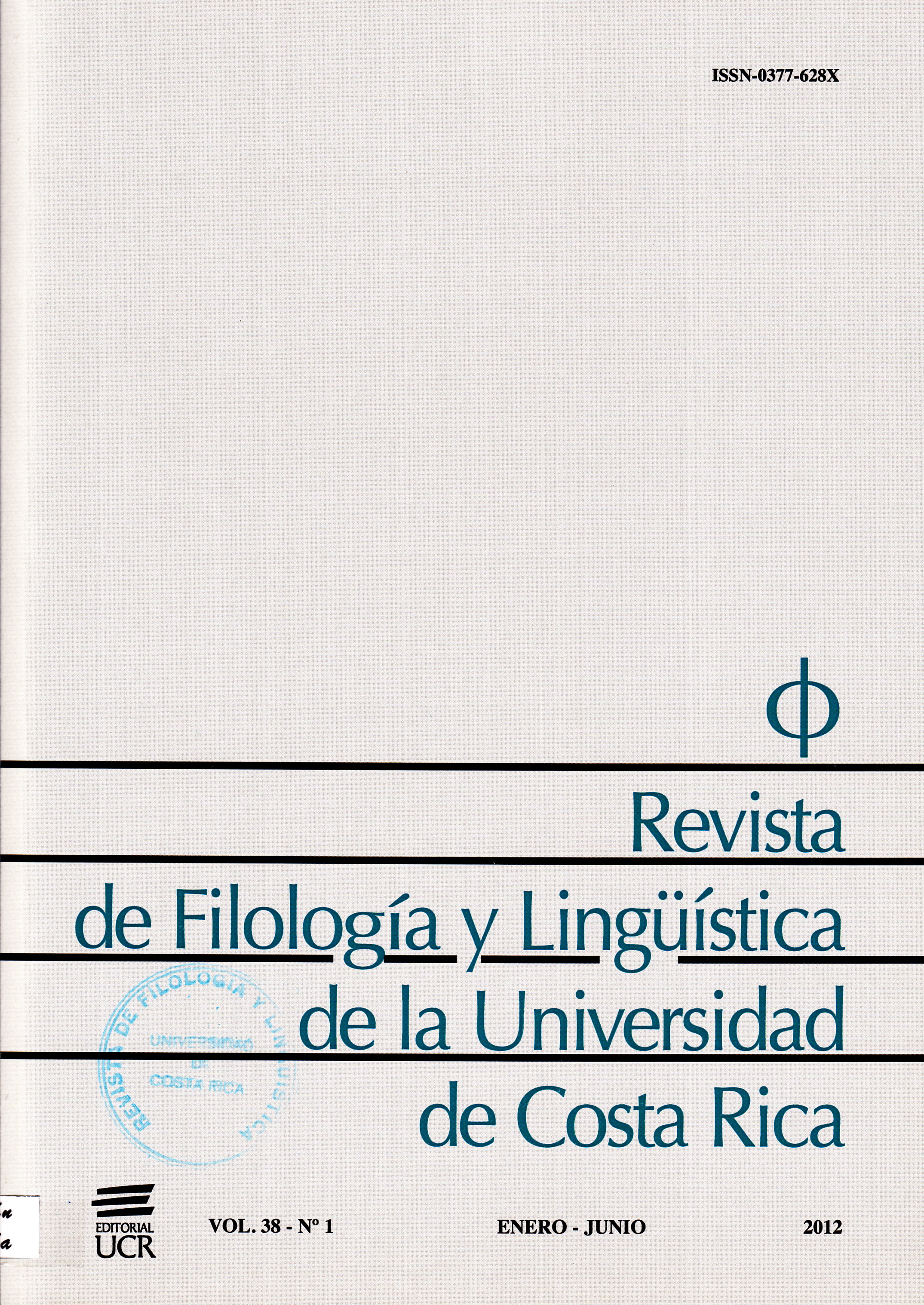Resumen
El narrador de Los pasos perdidos (1953) de Carpentier, ha intrigado y confundido académicos y críticos desde al menos inicios de 1970 cuando Roberto González Echevarría señaló lo que caracterizó como una disonancia en la voz narrativa de la novela. El presente análisis desafía las interpretaciones autobiográficas primarias de la novela que han surgido en los últimos años, favoreciendo en cambio por una voz narrativa paródica que sin saberlo se apropia, entre otras tradiciones, el popular género de ficción de mundo perdido.Citas
Acosta, Leonardo. 2004. Alejo en tierra firme: intertextualidad y encuentros fortuitos. La Habana: Centro de Investigación y Desarrollo de la Cultura Cubana Juan Marinello.
Alegría, Fernando. 1976. Literatura y Revolución. México, D.F.: Fondo de Cultura Económica.
Becker, Allienne R. 1992. The Lost Worlds Romance: From Dawn Till Dusk. Westport, CT: Greenwood Press.
Bendix, Regina. 1989. “Tourism and Cultural Displays: Inventing Traditions for Whom?” Journal of American Folklore. (102): 131-146.
Boorstin, Daniel. 1964. The Image: A Guide to Pseudo-Events in America. New York: Harper.
Campra, Rosalba. 2008. “Narrativas entre el presente y la historia”. Revista Casa de las Américas. 252: 129-141.
Capra, Frank. 1937. Lost Horizon. Estados Unidos: Columbia Pictures, B/N, 134 min.
Carpentier, Alejo. 1985. Los pasos perdidos. Roberto González Echevarría (Ed.). Madrid: Cátedra.
Clifford, James. 1988. The Predicament of Culture: Twentieth-Century Ethnography, Literature, and Art. Cambridge: Harvard University Press.
Conan Doyle, Sir Arthur. 1912. The Lost World. New York: Hodder & Stoughton.
Conrad, Joseph. 1988. Heart of Darkness. (3rd ed.). New York: W. W. Norton.
Lord Jim. Thomas C. Moser (Ed.). (2nd ed.). New York: W. W. Norton.
Deane, Bradley. 2008. “Imperial Barbarians: Primitive Masculinity in Lost World Fiction”. Victorian Literature and Culture. 36: 205-225.
De Ferrari, Guillermina. 2002. “Enfermedad, cuerpo y utopía en Los pasos perdidos de Alejo Carpentier y en Pájaros de la playa de Severo Sarduy”. HR. (70): 219-241.
Forrest, Jennifer. 2008. The Legend Returns and Dies Harder Another Day: Essays on Film Series. Jefferson, NC, and London: McFarland & Co.
Gingerich, Stephen D. 2001. “Culture and Anonymity: The Other Voice of Los pasos perdidos”. CR: The New Centennial Review. (1): 229-255.
González, Eduardo. 1986. “Framing Carpentier”. MLN. (101): 424-429.
González Echevarría, Roberto. 1971. “Ironía narrativa y estilo en Los pasos perdidos de Alejo Carpentier”. Nueva Narrativa Hispanoamericana. 1 (1): 117-125.
(1977). Alejo Carpentier: The Pilgrim at Home. Ithaca: Cornell UP.
(1998). Myth and Archive: A Theory of Latin American Narrative. Durham and London: Duke University Press.
(1985). “Introducción”. In: Carpentier. 15-56.
Harney, Michael. 2008. “Tarzan in Novel and Film”. In: Forrest. 57-80.
Hilton, James. 1964. Lost Horizon. New York: Pocket Books.
Kadir, Djelal. 1986. Questing Fictions. Minneapolis: University of Minnesota Press.
MacCannell, Dean. 1976. The Tourist: a New Theory of the Leisure Class. New York: Schocken Books.
Empty Meeting Grounds: The Tourist Papers. London and New York: Routledge.
Millington, Mark I. 1996. “Gender Monologue in Carpentier’s Los pasos perdidos”. MLN. (111): 346-67.
Pancrazio, James J. 2004. The Logic of Fetishism: Alejo Carpentier and the Cuban Tradition. Lewisburg: Bucknell University Press.
Rosman, Silvia N. 2003. Being in Common. Nation, Subject, and Community in Latin American Literature and Culture. Lewisburg: Bucknell University Press; London: Associated University Presses.
Stronza, Amanda. 2001. “The Anthropology of Tourism”. Annual Review of Anthropology. (30): 261-283.
Swift, Jonathan. 2001. Gulliver’s Travels. (3rd ed.). New York: Norton.
Torgovnick, Marianna. 1990. Gone Primitive. Savage Intellects, Modern Lives. Chicago: University of Chicago Press.
Urry, John. 1990. The Tourist Gaze: Leisure and Travel in Contemporary Societies. London: Sage.
Wimsatt, William K. and Monroe C. Beardsley. 1954. “The Intentional Fallacy”. (Rev. ed.). In: The Verbal Icon: Studies in the Meaning of Poetry. Lexington: University of Kentucky Press.

